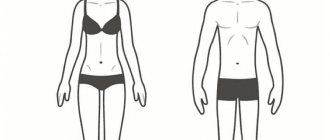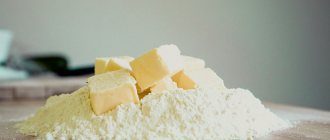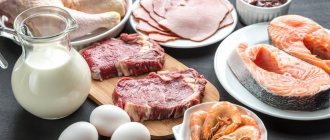Body types
There are three main body types:
- Asthenic or ectomorphic. With this type, a person has weak muscles, a small amount of fat deposits, thin bones, long limbs and a prominent chest. The volume of substances occurs in such people 10% faster than in others.
- Normosthenic or mesomorphic. All parts of the body are proportional.
- Hypersthenic or endomorphic. It is distinguished by the presence of an impressive volume of fat cells. It is more difficult for representatives of this type to fight excess weight. It is not difficult for such people to build muscle.
Possible causes of weight loss
There are several factors that influence being underweight:
- Genetics. People with an ectomorphic physique have a harder time gaining weight, nature itself took care of this.
- Irritating factors: bad habits, stress, unhealthy lifestyle, consumption of harmful foods and drinks, lack of sleep.
- Diseases of various origins.
Diseases
This reason is the most serious and requires immediate intervention. What ailments provoke weight loss? So this is:
- Immune system disorders.
- Diseases of the gastrointestinal tract (ulcers, gastritis, impaired absorption of nutrients).
- Intoxication by parasites.
- Infectious and viral diseases.
- Oncology.
- Alcoholism.
- Hormonal imbalance (thyrotoxicosis of the thyroid gland, diabetes mellitus, decreased production of cortisol in the adrenal cortex).
- Rachiocampsis.
If the goal is to quickly gain muscle mass for a very thin guy at home, you should first undergo an appropriate examination to identify the cause of the lack of body weight.
Others
Eating behavior can be changed as a result of stress: some people lose their appetite, while others “eat up” the problem. Appetite is restored only after the cause of anxiety is eliminated. If the source of stress is at work or in your close environment, then it is better to change the environment, since constant overstrain can lead to depression.
Smoking is another reason that prevents you from gaining weight, because this addiction dulls the feeling of hunger. Well, and, of course, lack of caloric nutrition is the most common problem of young people, so before a teenager gains weight quickly at home, attention should be paid to organizing proper nutrition.
Other side effects of corticosteroids
- Suppression of adrenal function - with long-term use of corticosteroids, a complete cessation of the production of own hormones can occur.
- Suppression of immunity - chronic diseases worsen, susceptibility to various infections increases.
- Diabetes mellitus (steroid) - metabolic disorders occur and cell sensitivity to insulin decreases.
- Increased blood pressure - the tone of blood vessels increases, the heart rate increases, therefore, the heart pumps blood faster, and vascular resistance is high.
- Stomach ulcer - can appear due to decreased immunity and increased acidity of gastric juice.
- Osteoporosis (bone breakdown) – bones become brittle and the risk of fractures increases.
- Sleep disturbance - there are problems falling asleep, shallow sleep, and, as a result, lethargy all day.
- Myopathies - against the background of muscle protein destruction, muscle atrophy and a decrease in muscle mass occur.
- Withdrawal syndrome - accompanied by pain in bones, muscles and joints, headache, nausea and weight loss, therefore abrupt withdrawal of corticosteroids during long-term treatment is PROHIBITED!
Is it possible to gain weight at home on your own?
Very often, owners of an asthenic body type ask themselves the question: how can a man gain weight by 10 kg in a week at home? In fact, there are safe methods that can help you overcome this trouble, but this will require time, patience and lifestyle changes.
Corrective measures include:
- increasing the daily calorie intake;
- proper nutrition and drinking regime;
- treatment of diseases leading to pathological thinness;
- organization of physical activity, proper rest and sleep;
- taking vitamins and supplements.
How to calculate body mass index
To determine this value, the formula is used:
Weight in kilograms / height in meters squared.
The result is interpreted as follows:
- Value less than 20: underweight.
- Between 20-25: normal weight.
- 25 – 30: slight excess.
- 30 – 40: overweight.
- Over 40: obese.
Body mass index helps determine the weight category to which a male belongs.
How to calculate your optimal weight
This characteristic largely depends on height and age, so before a guy gains 10 kg in a month at home, changes his usual lifestyle and diet, you should find out how far the real weight is from the optimal one.
The simplest formula that can be used by people who do not suffer from serious illnesses is: (height (cm) – 100)x0.9. The resulting value will be the optimal weight.
Diet for weight gain
What to eat to gain weight - a diet made up of healthy foods is the first step towards your cherished goal. Well, some rules and expert advice will be very helpful.
Nutrition rules
The main condition for gaining weight is proper nutrition - to gain weight, you need to follow the following recommendations:
- Don't overeat. You should eat often in small portions, preferably at certain times. If you quickly increase the number of calories, your stomach will suffer.
- Drink plenty of water, especially during sports activity.
- 20 minutes before meals you can drink 50-100 g of dry red wine to stimulate your appetite.
- Use seasonings, spices and pickles, but in moderation (mustard, horseradish, pepper, rosemary).
- Periodically prepare infusions of bitter herbs: mustard, wormwood, yarrow, dandelion, plantain, black currant.
- Avoid processed foods.
Calorie calculation
Sports nutrition for weight gain for a man should consist of three main meals. In the morning it is advisable to prepare porridge and fruits, for lunch - side dishes and meat soups, for dinner - salads, meat dishes with side dishes. Products must be fresh and beautifully presented.
A man can gain weight in a week at home if he consumes forty calories per kilogram of weight, gradually increasing this figure to sixty.
There is another way to calculate calories, which takes into account the lifestyle and activity of a man. The basal metabolic rate expresses the number of calories a man needs to maintain the vital functions of the body, it is calculated as follows:
10 x weight in kilograms + 6.25 x height in centimeters – 5 x age + 5.
Then we multiply the resulting value by the following coefficient depending on the level of activity:
- When sitting at 1.2.
- When playing sports up to 3 times weekly at 1.375.
- With average activity and training up to 5 times a week – by 1.55.
- With high activity, daily training – by 1.725.
- At very high load - by 1.9.
For example, if a 14-year-old teenager needs to gain weight by 5 kg per month, his height is 168 cm, his weight is 50 kg, his activity level is average, then we calculate:
10 x 50 + 6.25 x 168 – 5 x 14 + 5 = 1485 kcal.
Next, 1485 x 1.55 = 2301 kcal - a guy should consume at least this amount of calories every day. The amount of carbohydrates and proteins consumed also plays a decisive role in how to increase body weight and properly formulate a diet.
Counting carbohydrates
The body needs about 4-5 grams of carbohydrates per kilogram of weight. Using calorie tables, we determine which foods contain them and in what quantities. About 70% of carbohydrates come from bread and cereals, the rest from fruits and healthy sweets.
How much protein should you consume per day?
The protein norm per 1 kg of current weight is 2.3-2.5 g. It is this component that is necessary in order to quickly gain weight at home and increase muscle mass. Protein food should be present on the table every day.
What principles should you follow to gain weight?
The main principle of weight normalization is the balance of energy consumed and expended. People leading an active lifestyle need more calories per day than couch potatoes or mental workers. Growing bodies, i.e. teenagers or pregnant women, need more nutrients than older people. However, the latter are more susceptible to any negative influences; with age, the function of taste and olfactory receptors becomes dull, but their nutrition should not be depleted.
The second tactic for gaining weight is to consume nutrient-dense foods. It is necessary to understand that not every dish is a source of useful and nutritious substances. For example, fast food or confectionery - they quickly satisfy hunger, but contain a minimum of proteins, which are rich in, for example, a serving of beans or an avocado.
Steps on the path from low to normal weight:
- measure the amount of calories consumed and expended - an underweight person needs at least 3,000 calories per day with moderate physical activity; in addition, there are a lot of formulas that allow you to determine individual needs: for young women who do not engage in heavy physical labor, the norm is about 2800 kcal per day, for men - 3300 kcal per day;
- for women performing heavy physical activity, the daily calorie intake can reach 3500, for men - up to 4500;
- an increased amount of calories per day is required for pregnant women (up to 3200) and breastfeeding women (3500);
- in old age and with a sedentary lifestyle, 2100 kcal is enough for women, and 2500 for men;
- a balanced diet, subject to certain rules: consume food in moderation, do not overeat;
- maintain the proportions of carbohydrates, proteins and fats as 3:2:1;
- diversifying your diet is both a prevention of overeating and a complete source of vitamins and microelements;
- consume food more often, but in smaller portions, for example, in five meals per day;
- focus on vegetables and fruits, as they contain fiber and dietary fiber;
- limit the amount of fatty, sweet and starchy foods, alcohol - although this is high in calories, it does not saturate the body with useful substances;
- Of the vegetable oils that are so necessary for the body, it is necessary to give preference to those that have not undergone heat treatment, that is, for example, season fresh salads with them;
- limit your intake of salt and refined sugar;
- The amount of plain still water consumed per day should reach 2 liters.
Products for weight gain
The diet must take into account the following products:
- Poultry, rabbit, beef. It is recommended to eat about 200 grams daily.
- Protein foods: eggs, tuna, chicken, cottage cheese, peas, beans, shrimp, crabs.
- Carbohydrate food. About 60% of the foods consumed daily should be rich in carbohydrates. These are fruits, pasta, cereals. Fresh vegetables, such as carrots, beets, whole grain or rye bread, rice.
- Fats. The content in the daily diet is about 15%. Eggs, fatty fish, vegetable and butter, nuts, seeds, sour cream, peanut butter are healthy.
What should a man eat to gain weight in a week at home? This is everyone's favorite jam, honey, bananas, peaches, apples, dried fruits. All these delicacies can be eaten in between main meals. As a snack, you are allowed to treat yourself to a tasty but healthy dessert.
For those who don’t know what to do to quickly gain 5 kg in a week, you can prepare a special cocktail from two cups of powdered milk, two liters of regular milk and 140 g of protein, but you can drink it only when serious physical activity is not planned .
How many times a day and at what time should you eat?
The frequency and timing of meals are as important as what to eat. It is important to break out of the captivity of the stereotype called “3 meals a day.” It is preferable to eat 4-7 times a day at intervals of 3 to 4 hours. I know that for most people this is quite difficult due to work, study, etc., but you should try to eat often and in small portions if possible. If the king of bodybuilding, Ronnie Coleman, can work out a full-time job and still stick to a bulking diet, then so can you!
Ideally, each meal should contain a certain amount of protein, fat and carbohydrates. It's easy to figure out how much of what should be in each of them. Simply take the total number and divide by the number of meals you plan to eat during the day. Let's say my 90 pound man eats 6 times a day. Each meal should contain about 33-50 grams of protein, 80-85 grams of carbohydrates and 8 grams of fat.
You should try to eat 1 time 1 hour before training (to have energy for exercise) and 1 time after training (nutrients for muscle recovery).
For guys with a thin build
If you are naturally thin and have a fast metabolism, I would recommend adding carbohydrates to your diet for more calories and increasing the amount of high-calorie foods in your diet.
Learn more about how to bulk up an ectomorph and make your muscles grow.
I am a real hard gainer, with natural thinness and a reactive metabolism. While this has its benefits (like burning fat), it also means I need to eat more calories to gain weight. Read the article about nutrition for ectomorphs, there is a lot of useful information on the topic. If you have the same body type, you need to literally eat as many carbs as you can.
Easy, isn't it?
That's all, actually. This is the easiest way to plan a diet to gain weight. There are many other aspects of diet and meal planning (such as sports supplements), but I did not touch on them in this article, but tried to address the simplest things.
Menu options for the day
Standard option
It looks like this:
- Breakfast. Omelette, bread with butter and cheese, vegetables.
- Snack. Fruits, nuts, cottage cheese.
- Dinner. Buckwheat with meat, vegetable salad.
- Snack before training. Fruit smoothie with added protein.
- Post-workout snack. Protein food with healthy sweets.
- Dinner. Garnish of carbohydrates, fish, vegetables.
- Before bedtime. Cottage cheese.
Additional option
- Breakfast. Oatmeal with milk, boiled eggs, grain bread.
- Snack. Bun with poppy seeds, apples.
- Dinner. Rice with vegetable puree, bread, half a chicken breast.
- Snack. Vegetable puree with the other half of the breast.
- Dinner. Potatoes with vegetables, fish.
- Before bedtime. Cottage cheese.
Dietary supplements for weight gain
What to eat to gain weight quickly – Diet will certainly help, but you can consider taking additional supplements that will ensure that you gain weight quickly.
The use of these drugs should be carried out under special supervision, since their excess affects men's health. Excessive consumption can lead to impotence or tumors in the prostate gland.
Among the hormonal drugs that will help a man gain weight by 10 kg or more quickly at home are:
- Peritol;
- Chlorpromazine;
- Andriol;
- Cyproheptadine.
Another, safer drug is brewer's yeast for weight gain - which one is better to choose depends on the individual characteristics of the body. In general, they have a positive effect on the body, improve appetite and are the main assistant in how to add weight to a man, although women can also use this tool to build muscle if they engage in intense exercise.
Yeast contains 27 amino acids and beneficial vitamins. The calorie content of one kilogram of this drug is about 4500, which is almost three times more than in meat. Therefore, to the question – is it possible to recover from brewer’s yeast, the answer will be in the affirmative.
The following types of drugs are also used in the sports environment:
- Gainers. Carbohydrate-protein substance for accelerated muscle growth.
- Nutrizon. For weight correction in case of exhaustion.
- Riboxin. Stimulates energy metabolism processes in cells.
- Enzymes to improve digestion (Mezim, Pancreatin, Festal).
Main principles of the diet
A sports diet is a balanced diet that involves frequent meals in small portions. Of particular importance is the type of products and their quantity. Not all food, even if it contains protein, is suitable for the diet.
Meal frequency
Numerous studies have shown that to gain muscle mass you need to eat frequently - at least 5 times a day. This makes the anabolic effect almost permanent, as a result of which the muscles receive the amino acids necessary for growth. If you eat food rarely, but in large portions, then the excess nutrients will be stored by the body in the form of fat. And then you will have to think not about gaining muscle mass, but about losing weight.
Thanks to the large selection of sports nutrition, it is not difficult to organize the right snacks without harm to your health and muscles. Ideally, you should stock up on protein bars that are high in protein.
Calorie content of food
In order for muscles to receive nutrients for active growth, you need to consume only high-calorie foods. But this does not mean that you need to lean on cakes and fast foods. It is important to distinguish between healthy and unhealthy high-calorie foods. For example, beef is high in calories and healthy, but sausage is high in calories and not healthy.
Approximately 70% of the diet should consist of high-calorie foods. The remaining 30% comes from vegetables and fruits. You shouldn’t rely too much on them - the fiber contained in the composition stimulates intestinal contractions, which prevents the full absorption of nutrients.
Combination of fats and carbohydrates
When gaining muscle mass, try to limit yourself in consuming saturated animal fats (margarine, lard, fatty meat, sausages). Better yet, give them up completely to stimulate muscle growth, not cellulite.
But the presence of carbohydrates in the diet is mandatory. Moreover, fast carbohydrates do not need to be avoided, but they can be consumed only after training to restore strength. Whenever possible, choose something natural, such as a multi-ingredient protein. It will help the body recover and gain strength after training of any intensity. The rest of the time, give preference to slow carbohydrates. And the best representative of this group is cereal.
Drinking regime
An important condition for gaining muscle mass is drinking plenty of water. And we are talking specifically about water, and not about liquid in principle. Drinking tea, of course, is good and even healthy, but it cannot relieve dehydration.
Remember that without water, metabolism slows down and natural processes in the body are disrupted. And those who regularly engage in sports experience a tremendous need for water. Therefore, remember - you need to drink 3-4 liters a day. Distribute this norm over several doses, it is advisable to drink 2 glasses every hour.
It is especially important to drink fluids during exercise. Always keep a bottle of plain water with you. If you don't feel like drinking water, buy an isotonic drink. This sports drink quenches thirst well and restores water-salt balance.
Workout
There are many ways to increase body weight, one of the most effective is a properly designed training program. Physical activity will ensure muscle definition and proper distribution of fat.
Exercises at home
To do this, you only need free time and sports equipment: barbell, horizontal bar, dumbbells. The following exercises are performed:
- Working with dumbbells (raising arms to the sides, bending and straightening arms, bench press).
- Pull-ups and hanging on the horizontal bar.
- Raising straight legs.
- Push-ups with different hand positions.
- Deep lunges.
- Squats with weights.
Strength training is organized 3 times a week, the number of aerobic training is minimized. You need to increase the load gradually, bringing the number of exercises to 15, and approaches to 5 times. Each lesson consists of the following stages: warm-up, strength exercises, cardio training, cool-down.
TOP 5 nutrition tips for better muscle growth
To maximize muscle building quickly, diet is critical.
Your body is a machine that constantly reassembles itself. Any andrologist will confirm this idea. Every minute of every day, it breaks down its own tissues and replaces them with materials that are a combination of the food you eat and the processed substances it extracts from other tissues.
No matter what your social media profile says about your age, your components are significantly younger. Even bones are renewed every 10 years. By these standards, your muscle cells, which are about 15 years old when you read this, are the oldest ones at the party.
Exercise causes protein in muscles to break down and build muscle mass much faster than under normal circumstances. Essentially, when you're training to become even more awesome than you already are, your main goal is to break down protein. But in the end, if you follow a balanced diet, you get more than you spent.
There are several ways to achieve this. The first and easiest: consume more protein than you currently eat. Protein itself is an anabolic steroid. It tends to be deposited in the muscles. The second is to train in such a way as to break down muscle tissue, which will cause it to become stronger and bigger in response.
Combining a diet rich in high-quality protein and a good strength training program is the oldest, proven, and only way to achieve this goal without the use of pharmaceuticals. And here is your best meal plan for gaining muscle.
Part 1: How much?
A 2007 study in the Journal of Applied Physiology found that muscle growth increased by 0.2 percent per day in the first 20 days of strength training. This growth exceeds the amount of protein simultaneously broken down in the muscles, although it is quite high.
This explains why a person who is just starting out or returning to the gym after a long break needs more protein than a strength-training veteran who has trained nonstop for years and is at or near his genetic ceiling for strength and size. But it is beginners who pay the least attention to their diet and are most at risk of not getting the protein they need.
How much is needed? This is approximately 1.6 grams of protein per kilogram of body weight per day. For a person weighing 80 kg, the daily norm will thus be 130 g.
Part 2: How often
Protein synthesis is the process of taking it from food and turning it into muscle tissue. As Dr. Mike Roussel explains, protein synthesis is like a light bulb. It either works or it doesn't work. At 20-25 grams of high quality protein, it works. Increasing the amount of protein will not increase the reaction, just as the room will not become brighter if you press harder on the switch.
Here's why it's important:
Most of us shift our protein intake towards the end of the day. We typically have a high-carbohydrate, low-protein breakfast (say, a bowl of cereal with milk), a moderate-protein lunch (a turkey sandwich), and a protein-rich dinner, such as a large serving of meat or fish. But a 2014 study in the Journal of Nutrition found that more protein from meals is converted into muscle tissue if the protein is distributed evenly across meals.
In this study, protein synthesis was 25 percent greater in subjects who consumed 30 grams of protein at each of three meals per day, compared with those who consumed the same amount overall, but almost all of it came at dinner.
Thus, for a protein diet to work, you need to consume it equally for breakfast, lunch and dinner: for example, an egg dish is a good start to the day.
A recent study in the Journal of Applied Physiology found that subjects consuming at least 20 grams of protein six times a day lost fat and built lean muscle with a low percentage of body fat, with and without exercise. They were given a protein supplement within an hour of waking up and no earlier than two hours before going to bed, and every three hours thereafter.
Perhaps eating six times a day is too much for you. But at least three of your meals should be rich in protein, especially if you're in the early stages of a new training program. Protein synthesis peaks in the first 16 hours after exercise and will remain elevated until 48 hours. Protein breakdown will also be increased within 24 hours.
What this means for you is that every meal matters. If you exercise three or four times a week, your body will be producing new muscle tissue every hour of every day, and at least half that time it will be breaking down that tissue.
Part 3: Before and after training
For consistent gym goers, protein synthesis peaks much earlier—about four hours after exercise—and returns to baseline levels more quickly. This is why the protein you consume immediately before and after your workout is so important.
In a 2012 paper in the American Journal of Clinical Nutrition, researchers compiled data from multiple experiments involving protein and strength training. They found that those who used the supplements gained an extra kilogram of muscle over 12 weeks compared to those who did not use them. Thus, they concluded that experienced athletes need pre- and post-workout protein supplements to achieve maximum results.
According to a 2013 study in the Journal of the International Society of Sports Nutrition, the "window of opportunity" when your muscles are most receptive to protein occurs between four and six hours after exercise. Ideally, you need a protein-rich meal two to three hours before your workouts and another one an hour or two after.
For those who train in the morning before breakfast, this window is narrower. According to research from Dietary Protein and Strength Training, when we sleep, protein synthesis slows down by 15 to 30 percent. Therefore, if you exercise before eating, you should eat as quickly as possible after exercise.
Part 4: Best Sources of Protein
Different types of food contain different combinations of amino acids, the building blocks of protein. Leucine is the most important of the 20 amino acids for building muscle. To obtain the maximum anabolic effect from food, 2 to 3 g of leucine is enough.
Almost any normal (that is, about the size of your palm) serving of meat or poultry will contain at least 2 grams of leucine. Three eggs, two glasses of milk, a piece of fish or a cup of yogurt will give you 1.5 grams. A cup of cottage cheese or scoop of whey protein (25 grams) will give you approximately 3 grams.
Among plant foods, soy is richest in leucine. There are 2.3 grams of it in a cup of soybeans. Beans and legumes in general are one of the best sources, with 1.2 to 1.4 grams per cup. A quarter cup of nuts or flaxseeds contains about 0.5 grams.
Part 5: Carbohydrates and Fats
If you had read this article ten years ago, it would have told you to consume carbohydrates while avoiding fat during your pre- and post-workout meals. The idea was that carbohydrates before a workout provide an easily accessible source of energy, and after it will help not only restore this energy, but also produce insulin, a hormone responsible for storing nutrients, in this case, for delivering protein to muscle cells. However, fat is digested more slowly and blunts the response of key hormones. All this was based on the assumption that your body is a repeat student, for whom the simpler everything is, the better. In general, your body seems to be telling you: thank you for caring, but no.
Here's what we know today:
- Those of us whose jobs require us to sit at a desk for long hours when we're not working out don't need carbs before exercise. There are already more than enough of them in reserve.
- You have plenty of time to replenish your energy reserves during the day, unless you do more than one hard workout per day. Regular meals should handle this just fine.
- Given this, it will be useful to combine proteins with carbohydrates when eating after a workout, be it food or sports nutrition. This will lead to slightly more protein synthesis, according to research from Dietary Protein and Strength Training.
- As for fat, it shouldn't bother you anyway. If you're just working out to look better, the total number of calories you consume matters more than the specific composition of the food or how you eat it. You can be lean and muscular on a low-carb or no-fat diet, with different combinations of meals and snacks in between.
Workouts in the gym
If there is such an opportunity, it is better to seek help from a professional trainer who will draw up a training program, introduce you to the technique of performing the exercises and other important nuances.
For best results it is recommended:
- Set yourself up for several years of hard work.
- Stop using pharmacological support drugs (hormonal injections, anabolic steroids).
- Train 3 times a week.
- Squats and deadlifts are the best exercises for gaining weight.
- Don't forget about pull-ups and bench presses from a standing position.
- Aerobic training should be 1/5 of strength training.
- Before starting any program, you should undergo an appropriate examination at a medical center.
Basic amounts of proteins, fats and carbohydrates
Like many other aspects of muscle hypertrophy, these numbers are debatable. Some people agree with them, others don't, but they can be used as a guide, and it worked for me. So, the basic amount you need to aim for on a daily basis is:
- Proteins: 1.5 - 2.5 grams per kilogram of body weight
- Carbohydrates: 5.5 grams per kilogram of body weight
- Fat: 0.5 grams per kilogram of body weight
So let's turn to my 200 pound man who wants to build muscle. Using the numbers above, he needs to eat 135-225 grams of protein, 500 grams of carbohydrates and 50 grams of fat per day.
Advice from nutritionists and fitness trainers
Some expert advice will help you cope with difficulties:
- You need to train on an ongoing basis, recording your own achievements.
- Muscles need good rest, and the body needs good sleep. You should take care of this: if you feel tired, it is better to take a break to recuperate.
- Constantly create the right menu, adding your favorite foods to your diet.
- Spend more time outdoors.
And, of course, to achieve your goal you simply need a good mood and the support of loved ones. It is very important to spend more time with dear and loving people!









